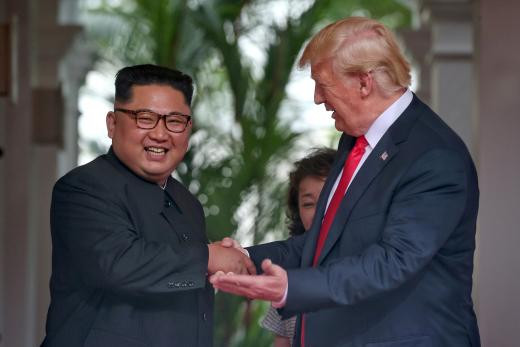Washington is now toughening its stance while reinforcing its military presence in the Korean Peninsula as it continues to move forward on the seemingly failing nuclear weapons talk with North Korea.
According to the Philippine Inquirer, Washington is now on the verge of giving the go-signal for the joint US-South Korean military drill in the peninsula. Moreover, Trump's surprising decision to cancel the visit of Secretary of State Mike Pompeo to North Korea is a clear sign that the president's effort to convince NoKor's Kim Jong-un to fully ditch his nuclear weapons had gone sour.
Earlier in June, a historic summit in Singapore saw the meeting of Trump and the Asian leader. An agreement was struck indicating the willingness of the two parties to help each other in achieving the "complete denuclearization of the Korean Peninsula."
However, the plans quickly went down south when Trump decided to make a U-turn on the deal. First, was by nixing Pompeo's slated visit to Pyongyang. The reason, as pointed out by news outlets, was the "belligerent" letter from NoKor's Kim Yong Chol, who served as the vice chairman of the hermit kingdom's ruling party.
The second manifestation that the US-NoKor agreement is now close to being blown out of smoke was the decision from Washington to hold suspension order on the military drills in the Korean Peninsula. In fact, Defense Secretary Jim Mattis reportedly said that the Pentagon is now looking to add more joint exercises in the region.
North Korea, through its state-run news agency, Rodong Sinmun, responded by pointing out on the American country's "double-dealing attitudes." NoKor further accused White House of brewing up a "criminal plot to unleash war."
As cited over at Express UK, the editorial piece said that North Korea should take a "serious note" on how the US negotiates with its peers wherein at one side it is showing a "smile on its face" while on the other, is busy "staging secret drills involving man-killing special units."
The NoKor mouthpiece calls the White House's tactic as an example of a "gunboat diplomacy," which is made apparent by Washington's show of naval power in this specific region of Asia.
Lost in Translation
Several experts are now giving weight on the current situation between North Korea and the US. According to one political analyst, the problem of the agreement lies with the different opinions being held by both parties.
During the Singapore summit, the analyst pointed out, Trump may have thought that Kim was ready to give up his nukes. Kim, however, may have something else in mind. That is, to end Washington's alliance with South Korea.






